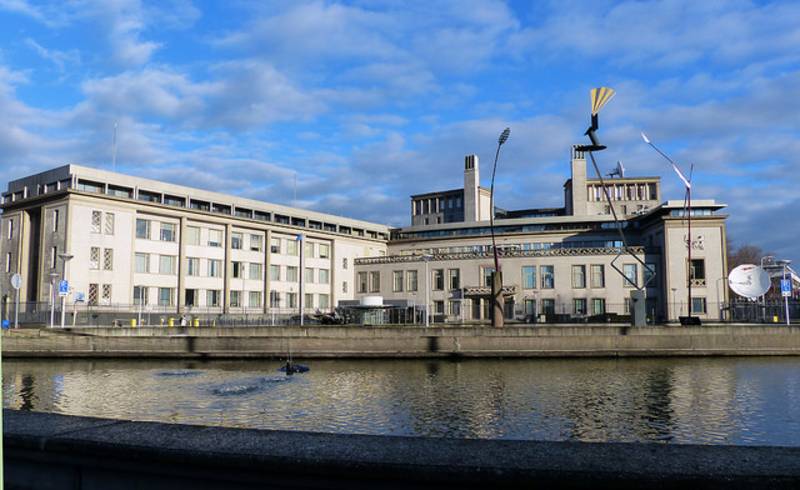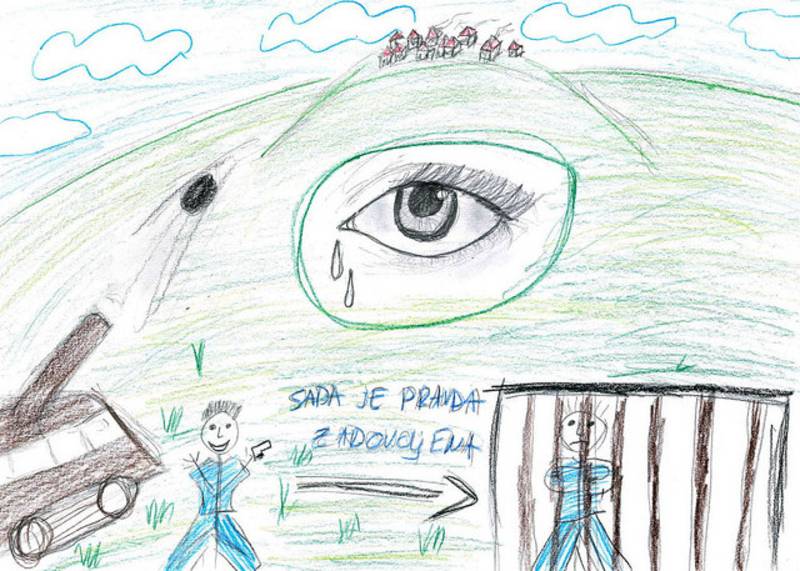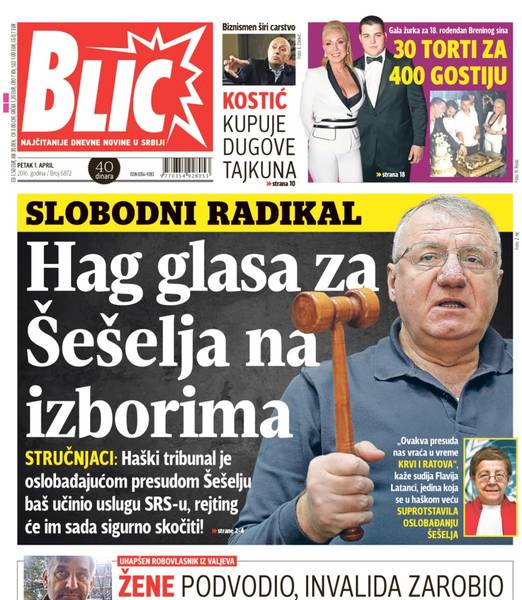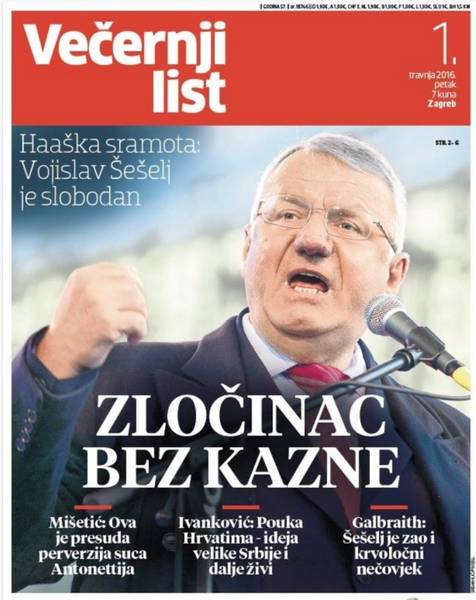Šešelj's Verdict: Justice in the Time of a Nationalist Rise in Europe
Adelina Marini, April 5, 2016
 In the very year in which in Germany the ban was lifted off Mein Kampf, in which Adolf Hitler lays out his Nazi ideology and his plans for the future of Germany; when in Europe, for the first time since the Second World War, hate speech, xenophobia, and nationalism, provoked by the refugee crisis, began developing into the new (old) normal, the International Criminal Tribunal for the former Yugoslavia (ICTY) practically announced that all such ideologies and hate speech are simply politics. Freedom of speech, if you will. This became clear from the sentence of acquittal, which Judge Jean-Claude Antonetti (France) read on March 31st live from The Hague on the trial against one of the most prominent hate-speakers – the Greater Serbia project ideologist Vojislav Šešelj.
In the very year in which in Germany the ban was lifted off Mein Kampf, in which Adolf Hitler lays out his Nazi ideology and his plans for the future of Germany; when in Europe, for the first time since the Second World War, hate speech, xenophobia, and nationalism, provoked by the refugee crisis, began developing into the new (old) normal, the International Criminal Tribunal for the former Yugoslavia (ICTY) practically announced that all such ideologies and hate speech are simply politics. Freedom of speech, if you will. This became clear from the sentence of acquittal, which Judge Jean-Claude Antonetti (France) read on March 31st live from The Hague on the trial against one of the most prominent hate-speakers – the Greater Serbia project ideologist Vojislav Šešelj.
Šešelj’s acquittal, using arguments that shocked all of former Yugoslavia and beyond, happened just a week after the same tribunal, but in a different Chamber configuration, sentenced the former president of Republika Srpska within BiH, Radovan Karadžić, to 40 years in prison on several charges, one of which was for genocide in Srebrenica. The reading of the sentence happened also in the middle of the election campaign for the preliminary elections in Serbia, scheduled for April 24th. The circumstances around the court case precipitated one more round of tensioning of relations between Serbia and Croatia, after a year and a half ago, totally puzzling many, the ICTY decided to let Vojislav Šešelj go free due to medical reasons with no conditions attached. Immediately after his return to Belgrade he restarted his incitement actions, hate speech and, in other words, he has returned completely to the rhetoric of this “glorious” days.
Due to his notorious actions, the chief prosecutor of the tribunal, Serge Brammertz, requested Šešelj’s return to the arrest facility in Scheveningen, but Serbian authorities did not provide the necessary cooperation for his capture and return to custody. As a result, the tribunal made the unprecedented decision to read the sentence in his absence. It was reached not unanimously, but with a majority in the Chamber, for Judge Flavia Lattanzi (Italy) abstained and published her own opinion on the case. Judge Antonetti took a lot of time in the reading of the verdict to read criticism aimed at the prosecution and the indictment, which, in his words, contains numerous contradictions and is confusing. He explained at length which evidence was considered and which was not. Serious attention was paid to Šešelj’s defence. At times, it looks like the Chamber agrees with it and with Šešelj himself.
The court did not make it their job to find out the whole truth about the events of that time, neither did it take into account the complex history of the conflict, says in the verdict. Its role, according to Judge Antonetti, was to give a legal answer to the prosecution’s allegations. “Therefore, this judgement is dependent on the limited truth that may or may not have been established by the facts presented before the Chamber”. The prosecution charges the politician Vojislav Šešelj, in his capacity of a leader of the Serbian Radical Party, to which he was also a co-founder, together with the current President of Serbia Tomislav Nikolić and Ljubiša Petković, as well as in his capacity of a member of the Serbian Parliament at the time of the commission of the crimes, in which the prosecution thinks he was involved and was a direct participant in. Word is of the period from August of 1991 to September of 1993, when Šešelj was allegedly a member of an joint crime enterprise.
The prosecution’s allegations, according to Judge Antonetti, are based on the ideology for a Greater Serbia. Besides war propaganda and inciting hatred towards the non-Serbian population, Vojislav Šešelj is also accused of recruiting volunteers to be sent on site to support Serbian military forces, who carried out attacks in several municipalities in Croatia and Bosnia and Herzegovina. The indictment contains a total of nine accusations  for persecution, deportation, and inhuman treatment, six accusations in war crimes, amongst which torture, cruel treatment, destruction of settlements, and plunder.
for persecution, deportation, and inhuman treatment, six accusations in war crimes, amongst which torture, cruel treatment, destruction of settlements, and plunder.
The Chamber, however, with the exception of Judge Lattanzi, dismissed all allegations and finds them unreasonable. Moreover, the majority of the Chamber considers that the plan for a Greater Serbia was in principle a political plan, not a criminal one. The Chamber finds no evidence to prove that there was a criminal enterprise in declaring the autonomy of the Serbian people of Croatia and Bosnia and Herzegovina. On the contrary, the possibility exists that the purpose of sending volunteers was protecting the Serbs. “The evidence shows that the recruitment and deployment of volunteers by Vojislav Šešelj and his party and the cooperation therein with other Serb forces, including the JNA/VJ, the MUP, the TO and the other paramilitary formations did not constitute an unlawful activity. On the contrary, it could have been amply justified by the context of the war”, is written in the Tribunal’s verdict.
The Chamber refers to the legal framework of the then Socialist Federal Republic of Yugoslavia (SFRY). Besides, Šešelj was not the hierarchical commander of the volunteers, thus not responsible for their actions. “The totality of the evidence substantiates the fact that the purpose of sending volunteers was not to commit crimes, but to support the war effort”, says in the verdict. What is even more shocking about it is the allegation that at the time, besides the local Serbs in Croatia and Bosnia and Herzegovina, there was an equal in scale arming of civilian Croats and Muslims. “In the view of the majority, this global picture gives credence to the reasonable possibility of a scenario in which all the warring factions were preparing themselves for the imminent hostilities in order to preserve the lands they considered as theirs, rather than a singular and unilateral step of the Serbian occupiers driven solely by the criminal purpose of expelling the civilians of other ethnic groups”.
With this statement the Chamber, excluding Judge Lattanzi, practically places under doubt the sentences read so far, including the one against Radovan Karadžić. The Chamber directly states that the purpose was to protect Yugoslavia, not committing crimes. The court accepts that the propaganda of nationalist ideology is not a crime by itself. An even more scandalous part of the verdict is that the speeches of Vojislav Šešelj in Vukovar were simply aimed at boosting morale, rather than a call for murders. His speeches, calling for ethnic cleansing of the “excrements” in Bosnia and Herzegovina are actually a form of stimulating the Serbian forces.
Judge Lattanzi is of the exact opposite opinion. She thinks the majority of the Chamber did not take into account the climate of intimidation, which Vojislav Šešelj created for witnesses. The rest of the judges relied on irrelevant considerations to exclude Vojislav Šešelj from responsibility. She feels the judgement was full of considerations, based on the right to war (jus ad bellum) and former Yugoslavia’s constitutional law, instead of on the laws of war (jus in bello), as it should have been. Judge Lattanzi writes also that Šešelj subdued witnesses with his conduct in the court room as well of that of his associates outside the court, which resulted in contempt proceedings. Several witnesses withdrew their statements as a result of intimidation by Šešelj. Facts, which were not taken into consideration by the majority in the Chamber.
Lattanzi feels there is more than enough evidence to support a conclusion that Šešelj really was responsible for the crimes, contained in the indictment with the exception of plunder, through his inflammatory speeches, calling clearly for the expulsion of the non-Serb population, in addition to his speeches in which he denigrated and dehumanised the Croats, comparing them to “primates” and “vampires”, coupled with his derogatory words aimed at Bosnian Muslims. Evidence further reveals that volunteers and their families were financially, medically, and psychologically supported by Vojislav Šešelj and his Chetnik movement and party during the entire period of their military service and even after that time, which  constituted another reason to enrol as volunteers. They thought of him as their “God” and “supreme commander”.
constituted another reason to enrol as volunteers. They thought of him as their “God” and “supreme commander”.
Judge Lattanzi also disagrees with the definition that the prosecution did not do a good job. “One can always do better, and the Trial Chamber could have also done better from the outset of this case, notwithstanding the difficulties it encountered during the trial”. The closing words of the Judge are especially strong: “On reading the majority’s Judgement, I felt I was thrown back in time to a period in human history, centuries ago, when one said – and it was the Romans who used to say this to justify their bloody conquests and murders of their political opponents in civil wars: “silent enim leges inter arma” (In time of war the laws fall silent)".
The reactions to the verdict were of shock and perplexity in Croatia, Bosnia and Herzegovina, and even Serbia. The verdict caught the Croatian prime minister in the middle of a visit exactly in Vukovar, where he stated that the verdict was a shame. His deputy Božo Petrov added that the Hague Tribunal had lost trust with this verdict and “the victims of Great Serbian politics and aggression have lost all hope that the hand of justice will fall upon the ones most responsible, the ones, who were like-minded with Šešelj, approved of him, and followed the Great Serbian aggression in Croatia and BiH”. Former First Deputy Prime Minister and Minister of Foreign Affairs of Croatia Vesna Pusić and candidate for UN secretary general announced that the verdict was shocking. “I have to say that I am totally shocked and surprised, I did not expect a sentence of acquittal for someone, who was a prime example of the concept that hate speech produces death, that this is not just some unpleasant display, but has human casualties and destruction as a consequence”, she said in an interview.
Šešelj’s verdict was one of the rare occasions that the people of Croatia got completely united. Most statements from former and current politicians called for a swift reaction by Serbia and the Serbs in Croatia. Reactions in Bosnia and Herzegovina were strong as well. There was a controversial reaction coming from Montenegro, however. Prime Minister Milo Đukanović announced that he was glad that Vojislav Šešelj is a free man. “I like it when every man walks free”, he said. “Regarding myself, I have been notified and congratulate Šešelj on his freedom”, he added. Đukanović used to be PM as well during the bloody disintegration of former Yugoslavia, when Montenegro was still a part of shrinking Yugoslavia.
Serbia delayed its reaction. Prime Minister Aleksandar Vučić announced he was calling a special press conference on the subject of the Tribunal’s work and on relations in the region the next day. At noon on Friday, after the emergency government meeting (such was also held after the sentencing of Karadžić), Vučić announced that he did not share the idea of a Greater Serbia and, while he can, he will be working against it. “Šešelj’s politics will never be acceptable. It is pushing Serbia into the past. This is politics, which will isolate us from all Balkan states as well as European countries. As long as this government is in power, and after that as well, we will vehemently resist all such politics”, also said Aleksandar Vučić. At the same time, however, the Serbian Prime Minister attacked Croatia, reminding that the Croats were not as shocked by the release of General Ante Gotovina, as they are now of the release of Šešelj.
He also stated that some crimes, committed during operation “Storm”, with which Croatia reinstated its territorial integrity in 1995, will never be punished. He listed the names of several victims, whose murders will remain unsolved, he said. He answered the question of a journalist, whom he accused of having someone dictating her what to ask, that those asking where he was 23 years ago, when he was one of Šešelj’s right-hand-men in the Serbian Radical Party as well as minister of information in the government of Slobodan Milošević, are actually the ones who reside in the past. He claimed not to have had contact with Šešelj for 8 years. He made it very clear that he had turned a new page in his life and does not like to be returned to his past, where he claimed not to belong for a long time now. Besides, Vučić suspected a scenario in the announcement of the verdict. He feels it is no coincidence it was announced right in the middle of the election  campaign in Serbia. They knew full well when to announce the verdict, as well as they knew its contents, he said.
campaign in Serbia. They knew full well when to announce the verdict, as well as they knew its contents, he said.
Both Serbs and Croats, as well as Bosnians were unanimous that the Tribunal had failed and that instead of bringing reconciliation, it adds to a further inflammation of animosity. There were strong reactions against the verdict in Serbian media as well. In a commentary [in Serbian] for the Blic tabloid, Veselin-Vesa Simonović wrote last week that Šešelj is a synonym for arrogance and primitivism in politics, but that there are many like him not only with the radicals, but in other parties as well, so it would be unfair for him to be the only one attacked. "There are not enough prisons to host all instigators of war and primates in Serbia”, also writes Simonović. According to him, the debates in the Serbian parliament are currently going out of the limits as well, regardless of the absence of the radical chieftain, thanks to the staff he trained himself. The columnist believes that Šešelj’s acquittal will bring back to the Skupština all those, who used to shock with their performances.
Dejan Anastasijević wrote [in Serbian] for the weekly political magazine Vreme that Judge Antonetti surpassed himself with the sentence against Šešelj. “The moment he began speaking of ‘Serbs of the Orthodox, Catholic, and Muslim faith’, he practically demonstrated that he has been contaminated with the ideology of the accused. The Judge did nothing more than an attempt to revise the history of the war in former Yugoslavia”. Anastasijević adds: “It is not difficult for one to imagine Šešelj in the company of Marine Le Pen, Geert Wilders, or Nigel Farage, not to mention the MPs from the Greek ‘Golden Dawn’, the Hungarian Jobbik, or the Bulgarian Ataka. Parties of the extreme right have a very solid block in this Parliament. Despite language differences, they will easily unite around how to deal with Muslims, homosexuals etc. If anything does not work out, Croatian MEPs Ruža Tomašić and Marijana Petir, also quite rightist, will assist. And perhaps Donald Trump could jump in to their aid, or they could invite him for a guest at their rallies. Wherever there are threats, insults, and screams, and nonconformists and journalists are getting their heads smashed, Šešelj is at home”, concludes his commentary Dejan Anastasijević.
The fact that Vučić denounced Šešelj’s politics is great news. More important, however, is whether he would do something to stop the hate speech, which he admitted himself in the press conference on Friday, is blossoming in Serbia, and he even gave himself as an example of a victim of hate speech. Cooperation with the Tribunal continues to be one of the most important conditions for the process of enlargement towards the remains of former Yugoslavia, which are not EU members yet. The question is whether the EU will do a full reassessment of the work of this tribunal and the impact it has on the process of reconciliation in the region, especially in the context of the latest verdicts.
Another factor that will have huge impact on Serbia mostly, but on the others that aspire to membership as well, will be how Europe itself deals with hate speech. The EU’s example in this respect is not encouraging at all. Last year, there was a study published, ordered by the European Parliament, on hate speech and the battle against it at the European level. Alas, the study was done based on information gathered from just seven national studies – Belgium, Germany, Greece, France, Hungary, The Netherlands, and Sweden. At the European level there is a directive on how should this be tackled, but the study shows that it has not been fully transposed in the national legislation of member states. Moreover, even if it is, it is not being fully implemented. The study found that the largest holes in the transposition of the directive are linked to the punishment of condoning, denying, or trivialisation of genocide, crimes against humanity, and war crimes, particularly Nazi crimes.
There is a recommendation in the study for the European Commission to begin infringement procedures against member states, which have not adopted the directive. The study highlights another very serious problem – there is not enough data on hate speech cases, for they are not always reported by the victims. This hinders the assessment of the full scale of the issue. This is why it is recommended that member states work towards encouraging the reporting of such cases through ensuring anonymity and providing support. A third problem is the lack of a shared understanding of the implementation of legal provisions and at the global scale at that. The study pinpoints a fourth problem as well – in most member states there is no raising of the question about the unnecessary restriction of the freedom of expression by legislation aimed at fighting hate speech and vice-versa. Only in France there is such an ongoing debate, and it is very important, for the line between freedom of speech and hate speech is very slim.
Fighting hate speech, especially in the context of the refugee crisis, is being done almost identically on the European level as the fight with the refugee crisis itself – strictly individually. For the first time last autumn there was a colloquium organised by the First Vice-President of the EC Frans Timmermans, but this remained with no consequences somehow.
Let us not forget, however, that to Aleksandar Vučić the EU had long lost the attractive force it had in the beginning. This is also happening in a very important moment for Croatia, where hate speech is gathering momentum and remains unchecked. Incidents are already too many and according to some colleagues, are already bearing fruit – the call of “For the Homeland We Are Ready", considered to be Ustashian, sounds more and more often at football games, and also around the streets of Croatian capital Zagreb, shouted by black shirt-wearing radicals of the war crimes convict Branimir Glavaš. Z1 television was temporarily off the air due to unacceptable hate speech against Serbs in Croatia being allowed in one of its shows. This brought about the resignation of the boss of the Croatian Council for Electronic Media,  instead of to a full revision of tolerance towards historic events, loaded with heavy politicisation.
instead of to a full revision of tolerance towards historic events, loaded with heavy politicisation.
Last week, there was an attack in Split on the famous columnist and writer Ante Tomić. The attack against him was denounced by the controversial minister of culture, Zlatko Hasanbegović, accompanied however by the warning that, after all, one should be careful what one comments and writes. This was interpreted as opening the hunting season for inconvenient journalists. And the cherry on the cake was the scandalous statement of Cardinal Josip Bozanić who, during the Easter Mass in the Zagreb cathedral, announced that the media were a conduit of evil. This sounds like saying that the Catholic Church is a breeding ground for paedophiles in the context of the movie “Spotlight”, which won an Oscar this year for its screenplay, based on a true story.
At this stage, the EU does not have many useful moves, and reconciliation in the region of former Yugoslavia is left to hang just on the goodwill of politicians from the area. Isn’t this too little just 20 years after the end of the bloodiest war in Europe after the end of WWII and at the background of more and more frequent terrorist attacks, carrying the marks of a deliberate cultural war against Europe?
*Some of the photographs are from the children’s festival “Sarajevo 2013", dedicated on how children see the Hague Tribunal.
Translated by Stanimir Stoev
 Bakir Izetbegovic, Andrej Plenkovic | © Council of the EU
Bakir Izetbegovic, Andrej Plenkovic | © Council of the EU Aleksandar Vucic, Recep Tayyip Erdogan | © Serbian Presidency
Aleksandar Vucic, Recep Tayyip Erdogan | © Serbian Presidency Jean-Claude Juncker, Zoran Zaev | © European Commission
Jean-Claude Juncker, Zoran Zaev | © European Commission